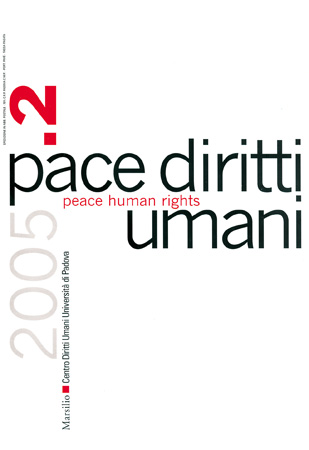Collections

I minori d’età di fronte alla Corte Interamericana dei Diritti dell’Uomo
- Contained in
- Pace diritti umani - Peace Human Rights, 2/2005
- Pubblication type
- Articolo / Saggio
- Pages
- 55-101
- Language
- IT
Children before the Interamerican Court of Human Rights
Karla Quintana Osuna, Gabriella Citroni
The American Convention on Human Rights (San José, 1969) addresses in a specific provision (article 19) the need for a special protection of children, due to their particular condition: «Every minor child has the right to the measures of protection required by his condition as a minor on the part of his family, society, and the State».
This provision, lacking in the framework of the European Convention on Human Rights, might be considered as a fundamental reference for any actor, national as well as international, dealing with the sensitive issue of the rights of children. But one may wonder if such a provision does correspond to a real degree of attention paid to the matter and how much it is respected within the Latin American context.
Unluckily, the response appears to be negative: Latin American children daily cope with extreme situations such as hunger, poverty, illness, sexual and labour exploitation and, in general, abandonment. The data provided by international organizations working in the field such as UNICEF show that children (human beings particularly defenceless and exposed to vexations), instead of being granted the highest level of protection, as it would be required, seem to attract even more severe violations of fundamental rights, denying them the right to live a peaceful childhood and hindering a harmonious development. In 1990 the Interamerican Court of Human Rights dealt with the tragic phenomenon of street children in Guatemala (case Villagrán Morales and others), delivering for the first time (even if it was not the first case where minors were involved) a judgement which declared the violation of Article 19 of the American Convention. The «street children» judgement has become a leading case within the Interamerican jurisprudence, also by affirming the substantially «revolutionary» principle that, to respect the right to life of the children, a State must not only avoid arbitrarily killing them, but it also has to grant them all the necessary conditions to live a worthy life.
Since 1990, the Interamerican Court has developed this principle, treating an ever increasing number of cases concerning violations of the rights of children (inhuman treatment, disappearances, tortures, extrajudicial executions and inhuman conditions of imprisonment) and also delivering an advisory opinion specifically addressing the issue of judicial guarantees States have to recognize to minors involved in judicial proceedings.
The present paper analyzes the mentioned jurisprudence, in an attempt to determine at what extent further developments might be reached by applying the principle of the best interest of the child and drawing all the relevant consequences.
The perspective undertaken is that of a complete «centralization» of the child and his or her needs, especially in the decision making mechanism, not only of the Interamerican Court itself, but mainly of the Latin American State authorities, in the hope of fulfilling what at present still remains only a mere promise of protection.
Children are the men and women of tomorrow, who deserve to have their dignity to be respected and their wishes to be listened to: a worthy future necessarily passes through this path. It is sometimes arduous, but the Interamerican Court has definitely moved a number of steps in the right direction.

